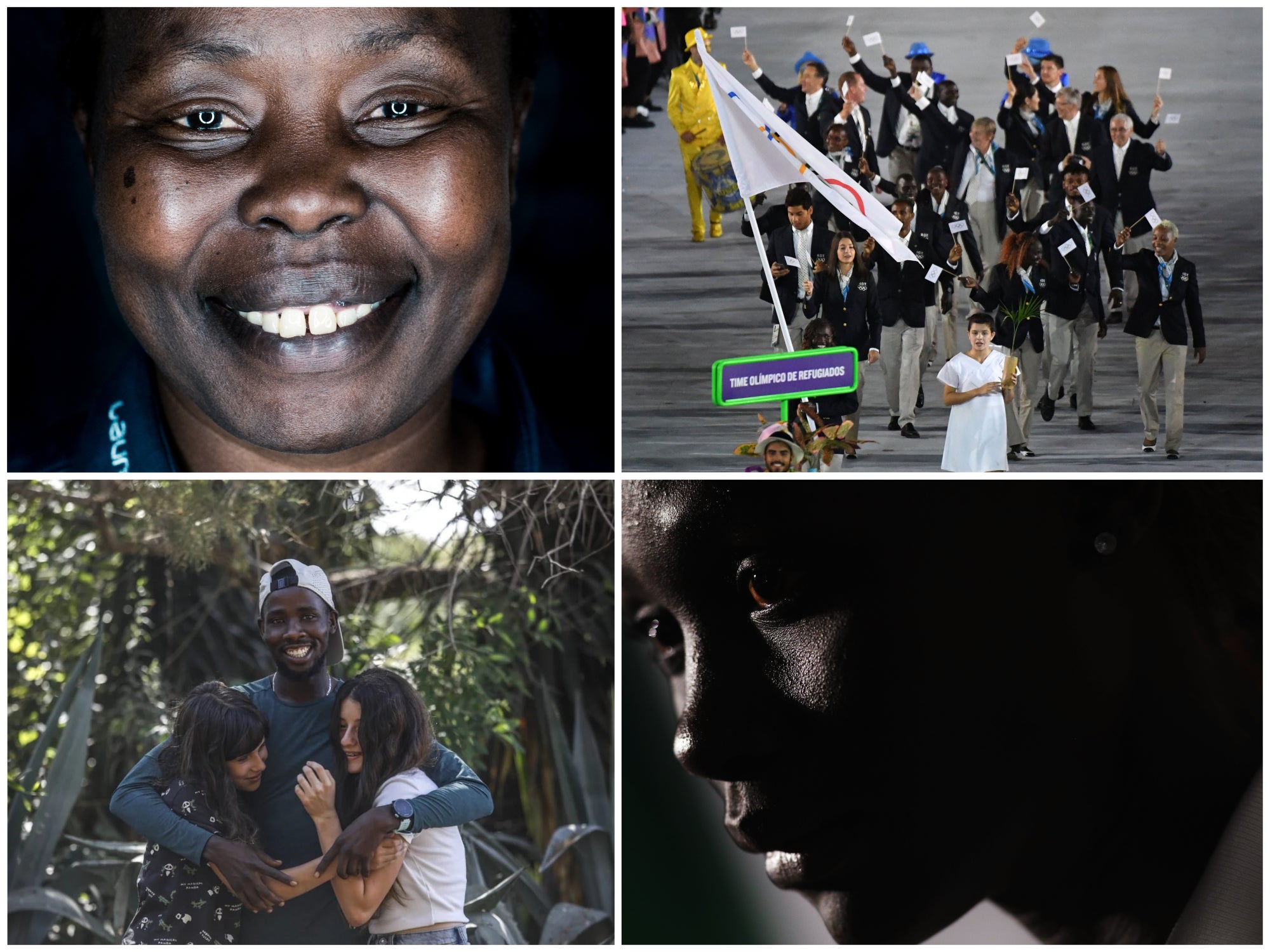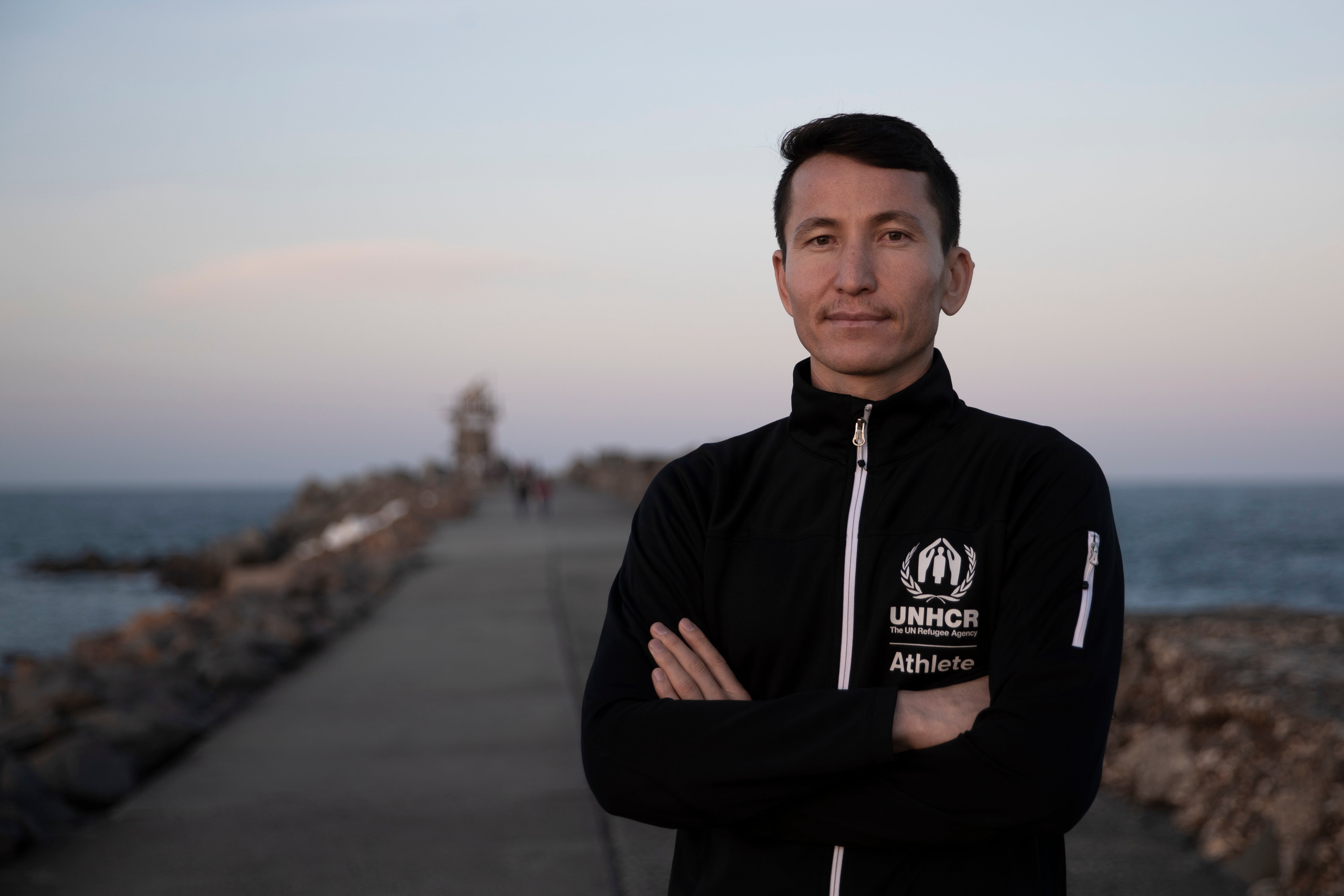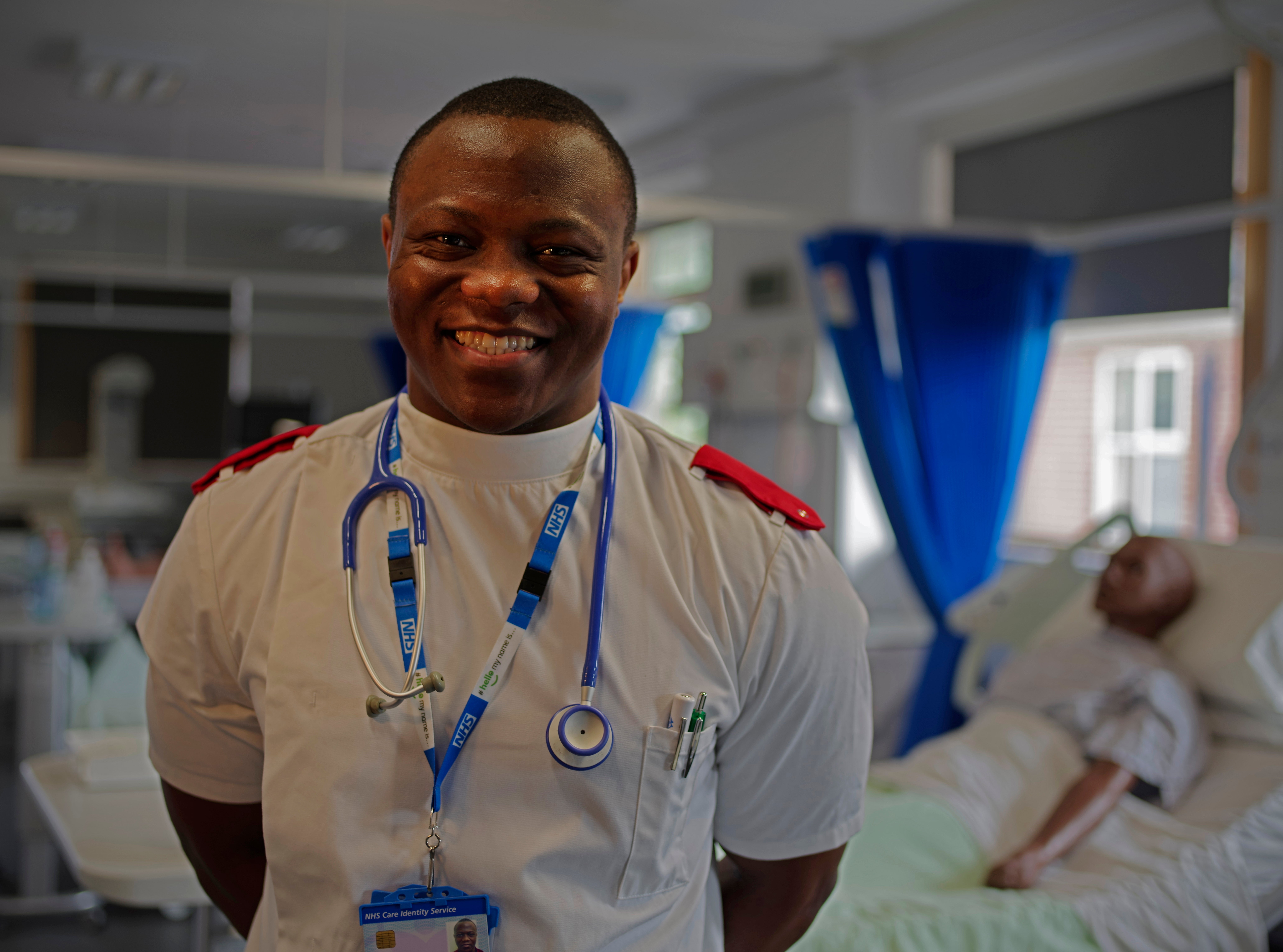‘A symbol of hope’: The fragile story of the Olympic Refugee Team
The IOC’s scholarship athletes have been training intensely despite the uncertainty surrounding the Games. They tell Tom Kershaw why their mission is not to win medals but send a message to the world


As the smell of burnt petrol curdled in the air, Asif Sultani held his breath and waited for the next wave to break overhead. Stranded in the Indian Ocean, petrified and nauseous, he watched blearily as grown men wrestled with children for lifejackets and families divvied up their last boiled eggs, the sulphur melding into the fumes. For days, he had seen nothing but sea and sky; day and night; just shades of blue and black but for the faces, all illuminated by the panicked whites of their eyes.
From the moment Sultani had set foot on the fishing boat, jostling for space among dozens of asylum seekers, he began to vomit uncontrollably. Now the salt stuck to his throat like sandpaper and he started to wonder if he was hallucinating until the screams jolted him and another wave crashed against the hull.
He had fled Afghanistan with “absolutely nothing but hope”, the promise of safety sustaining him through the starvation and sleepless nights. But with freedom fading on the horizon, he handed his lifejacket to the nearest child. For hours, the boat heaved with the sound of prayers, willing themselves above water like a lost island of worship, until finally, inexplicably, the decrepit engine spluttered back into life.
****
When Tegla Loroupe led the inaugural Équipe Olympique des Réfugies (EOR) off the plane in Rio de Janeiro, she hoped the terror and tumult of their stories would, above all, forge a lasting sympathy. The IOC’s president, Thomas Bach, hailed the team as a “message of hope to all the refugees of the world” and Barack Obama made plans to meet some of the athletes after the Games. Their participation was a triumph, a uniting force, and not only in a humanitarian context. Yusra Mardini, an 18-year-old Syrian refugee, won her heat in the 100m butterfly.
But what Loroupe feared was that their glowing reception distorted a darker reality. The 10 athletes she cared for like “sisters and brothers” were placed on a pedestal, adulated for their bravery. Yet, simultaneously, fear and scapegoating were abetting one of the world’s largest refugee crises. “Before the Games, when people thought of a team of refugees, nobody wanted to be close to them,” says Loroupe, the EOR’s Chef de Mission. “They used to talk bad about us, not knowing they’re serious athletes. People were afraid of what would happen.”
While Rio basked in the Olympic spotlight, the legacy of another Games took the shape of cramped white tents in Athens. Refugees waited there in abandoned stadiums by the thousand, stuck between life and death, bonded by a flickering hope of safety as populist governments barricaded their borders. For those like Sultani who dreamt of Australia, their only route to safety demanded that treacherous journey from Indonesia to Christmas Island, a remote external territory almost 1,000 miles from the mainland. Around 8,000 Afghans who could not bring themselves to board one of the boats have been locked in purgatory for up to a decade, banned from permanent settlement in southeast Asia, waiting for a country that will welcome them. The revelry of a podium has rarely been at such a contrast to the lack of compassion pervading our own ordinary lives.
“It’s so painful to share my story but I want people to understand that nobody chooses to be a refugee,” says Sultani. “I was seeking safety. That’s what freedom is. I only wanted to survive and not worry about someone killing me. We hit the bottom. We’ve already suffered enough.”

Sultani’s voice trembles as he recounts the trauma of his childhood. He can still hear the echoing cracks of machine gunfire; feel the tremors of anti-aircraft missiles exploding into buildings; tell the stories that were passed between Hazara households of Taliban soldiers appearing in the night and killing young men only a few years older than him. Then there is just the naked fear, the footsteps and screams, the desperate sounds of life’s most fragile feedback loop. His family’s only choice was to escape and so, in 2002, with all their belongings stuffed into a car, they drove towards Iran.
“We were stopped by thieves pointing guns at us,” he says. “I was screaming so loudly that they started hitting my dad, telling him to keep me quiet or else they’d shoot, but I was so afraid I couldn’t stop. They took everything. We arrived with nothing. I used to get bullied because of my ethnicity. Other kids would punch me, kick me, spit on me and humiliate me until I begged for mercy. I wanted to defend myself. That’s when I started martial arts.”
Sultani is now one of the 55 athletes benefitting from the IOC’s £1.4m scholarship fund, training relentlessly in pursuit of a place in Tokyo, entirely undeterred by the prospect of their cancellation. He has grown used to such uncertainty. When he was 16, he was deported back to Afghanistan and spent weeks hiding in a dilapidated hotel room. He was never able to say goodbye to his family. His love of karate has been one of the few constants in a life of loss. It is a sense of destiny, he says, that will take him to Japan. A duty, even, to change people’s perceptions, challenge their stereotypes and prove he can compete like anyone else. If the world can watch him as a sportsman, they can hear him as a human being, too.
“My dad passed away not long after I arrived in Australia in 2013,” he says through tears. “I used to blame him, asking why I was different. I’ll regret that for the rest of my life. It’s too late for me to say sorry, but I want people to know that we didn’t choose to be persecuted, we didn’t choose to leave our homeland or separate from our families. We didn’t choose this life. I’m not going to the Olympics to prove I’m the best. I’m not fighting for a gold medal, for myself or for a country. My mission is to go there and represent 80 million people who’ve been displaced; to fight for humanity and unite people together. I want to be a symbol of hope.”
****
South of the Sahara, Loroupe is that transcending figure. One of 24 siblings born in a rural Kenyan village, she defied unthinkable poverty and archaic sexism to become a trailblazing marathon runner. The first African woman to win in New York, her legacy is not just defined by records but the footprints she’s left in the sand. At the peak of her career, Loroupe began to organise ‘Peace Marathons’ within conflicted countries, persuading government officials to run alongside tribal leaders. A sole moderator between warring worlds, thousands laid down their weapons as a result. “People respect sport and that’s the platform I used,” she says. “It’s very difficult for one person to work alone but that’s where my strength comes from. ”
Half of the athletes on the inaugural EOR were born in what is now South Sudan. A religious war has ravaged the Christian country, which officially separated from predominantly Muslim Sudan in 2011. But the South’s inception did nothing to stem rival tribes’ bloody battles for power, killing one another over cattle, pastures and wells on the savanna. In all, the UN estimates that over six million people have been displaced by the conflict, the majority of whom are women and children on the brink of starvation.
Anjelina Lohalith was just nine years old, hiding in a bush with her family, when tribesmen razed their village and encircled the ashes with landmines. That memory is vivid, but everything before still feels hazy. A piece of her life she was too young to fully comprehend but misses so deeply. In 2002, she fled with an aunt to Kakuma, a vast camp home to 160,000 refugees in northwestern Kenya, dominated by distress and distrust. There is food, education and medical care, but the peace is paper-thin, the tribal violence ingrained into displaced families, the scars inherited from lost relatives. “I grew up without family or friends,” says Lohalith. “It was so hard, so painful. I didn’t have the basic needs like water, protection, even the language wasn’t the same. If not for Tegla, I don’t know where I would be.”

In the camp, Lohalith had read about Loroupe in a textbook. She had been running all her life, but never considered that it could be a sport, that it could take her to faraway places or wield any form of power. Before long, she realised she was better than most at it, too. “I loved it,” she says. “I didn’t know what was ahead of me. I just ran.”
After helping the IOC establish the scholarship programme, Loroupe discreetly visited Kakuma in August 2015 and held races to identify runners to take to her foundation in Nairobi. “We’re from the same universe,” Loroupe says. “I have to help them because at one point I was looking for someone to help me. I had nobody, I was struggling alone, no facilities, no money to go to competitions. I fought and I succeeded and now I’m fighting for them to be athletes, not having a stigma as refugees. You have to share their misery, their joyfulness and they become family, especially when Anjelina came along.”
Lohalith was the only woman to finish the 15km trial, her pain paling into hope, even as the ground blistered her bare feet. She had never been on a plane or heard of Brazil, but over the course of nine months of intense training under Loroupe, her time in the shorter 1,500m reduced dramatically. She ultimately finished 41st in her heat in Rio with a time of 4:47.38, almost 40 seconds behind the eventual gold medal winner. When competing against elite athletes who’ve been training their entire lives, the EOR’s expectations of glory are minuscule. But as Loroupe reminds them, their real fight is for something more than medals. “I felt so proud to represent so many refugees and be recognised,” Lohalith says. “Sport doesn’t care whether you are male or female or what colour you are. It just cares about talent. Being a refugee doesn’t mean you can’t show your talent.”
****
Earlier this month, the government in South Sudan was dissolved as part of a tenuous peace treaty between tribes. Conflict still rages throughout much of the country. Some in Kakuma sought to return to their villages but were never heard from since. It is not just that the refugees no longer recognise the places they once called home but that, between the destruction and death, the concept hardly exists. The IOC has offered the athletes a fleeting escape from their statelessness, but it is hardly a security and the instruments of war and geopolitics that force refugees from their homes rarely stop following them either. Until a country truly grants them freedom, their lives are always on the brink of exile.
The eldest of four siblings, Jamal Mohammed was just 10 when tribesmen raided his village, slaughtering 97 people, including his father. Their houses were burnt and the bodies were left strewn in the road. They fled in search of safety but were barely able to survive, cleaning shoes and scavenging food. Knowing they couldn’t last much longer, he obtained a fake passport and flew to Egypt, from where he made the death-defying 72-hour trek across the Sinai desert to reach Israel. Granted temporary asylum in Tel Aviv, he was able to find work as a painter, the money substantial enough to send home and support his family.
Every evening Mohammed would play football with other refugees and his endurance quickly became famous, playing for hours on end with barely so much as a pant, and soon a friend encouraged him to attend Alley Runners, an athletics club for the disadvantaged community in the south of the city.
Within three years, Mohammed was representing Alley Runners at international tournaments and came to the attention of the IOC. He also became part of a family after a volunteer at the club invited him into her home so long as he helped maintain the building. He refers to her as a mother, her two daughters as sisters, and Mohammed beams with pride and gratitude at the life he’s built. In Tokyo, he is aiming to compete in the 10,000m. But after a new normalisation agreement with Israel, he is one of the thousands who live in fear of being deported back to Sudan, and that everything he’s fought for will instead lead him back to the place he ran from.

“The thing is I’m afraid if I go back they’ll kill me or put me in jail, that’s the two options,” he says. “At the European Championships in 2018, I finished in 40th place and I was so happy with it but there was an Israel flag on my t-shirt [part of the Alley Runners uniform]. I’ve put my family in a bad situation… I can’t finish this story. It’s tough… I only have a couple of friends from the village. There were about 300 people of my age, I think from them maybe there are only 20 left. They are the ones who left like I did. You don’t know what’s going to happen. I have only a Visa [in Israel that frequently needs to be renewed]. That makes me afraid.”
The IOC’s support has allowed Mohammed to quit his job and focus on training full-time, but that luxury can still feel so trivial. Another promising athlete at Alley Runners has fled to Canada. Several of those who had been training at Loroupe’s foundation in Nairobi recently failed to return from a race in Germany over fears of being forcibly repatriated. It’s the hope of permanently belonging that fuels the perseverance of so many. Everything else is only temporary. For almost two decades, Mohammed has been running, but the truth is that sometimes it feels as though he may never be able to stop.
****
The state of the art gym at Middlesex University is not ordinarily where one expects to find a member of the IOC’s scholarship programme, at least until Cyrille Tchatchet hoists a barbell with a booming grunt. But for a strained second, even as 180kg sways above his head, the weight of the world seems so far from his shoulders. Not all refugees are born into tragedy, but the sudden nature of timing can be no less cruel. Tchatchet was already an established international competitor representing Cameroon at the 2014 Commonwealth Games when he vanished without a trace. Even now, he cannot bring himself to recall the events that occurred within the athletes’ village that plummeted his life into disarray. “Even my mum didn’t know why I wasn’t coming back,” he says. “Certain things happen that you might never be able to erase, but you have to learn to live with them.”
Tchatchet was granted refugee status in the UK in 2016. He cannot represent Team GB but is at least finally free of the uncertainty, his plight formally recognised, his freedom written on a legal document. He winces at the thought of the toll Mohammed has to bear. For Tchatchet, after sleeping in the streets for weeks in Glasgow and then Brighton, surviving only on biscuits, the fear of being sent back to Cameroon almost consumed him. “I would say I was scared... and hopeless,” he says after a long pause. “I didn’t see any light at the end of the tunnel. I thought I was going to end it all. I remember coming to this cliff, there was a Samaritans sign on the barbed wire and it said if you’re in distress call this number. It was like they knew what I was going to do. I was on the phone for so long until two police cars came up behind me. They put me in a cell and eventually got me to talk to a solicitor. He said I had to seek asylum.”

The anguish of that period left Tchatchet with an urgent desire to help. It is a bond that unites almost all refugees, a need to protect others from the pain they’ve experienced, regardless of how fragile their own circumstances remain. Sultani is a disability support worker in Australia. Lohalith and Mohammed are hoping to share the responsibilities Loroupe’s borne for over two decades. And while Tchatchet broke British weightlifting records, he studied to become a psychiatric nurse at Middlesex. During the pandemic, he worked on a frontline ward and was recently promoted to the role of lead nurse in Harrow, the simpler schedule enabling him to focus fully on his training regimen. “My personal experience is what made me want to study nursing,” he says, before tidying the mess of weights and setting off for his shift. “I’ve come across other asylum seekers. I can understand them and support them. It was the best decision I ever made.”
For all that their suffering is unique, that spirit is almost identical. Even if Loroupe knows the EOR could never stop ongoing crises alone, they are making a tangible difference to lives on a local scale. “They have a lot to share with the world,” says Loroupe. “That resilience is something everyone can learn from them. They are strong people who fought for life. They are not just refugees, they are ambassadors.”
****
As they finally approached Christmas Island, Sultani ran his hands through the water and waves of relief washed over the boat. But only once he saw the sand of the seabed did he truly believe they weren’t going to sink. Sultani knows he was one of the lucky ones. Another boat had crashed into the rocks at the tip of the island, causing 48 asylum seekers to drown. At one stage, four boats, each carrying up to 100 people were attempting to reach the detention centre a week, with its regular operating capacity exceeded by almost 2,000.
It is no haven, but it was safe. Not before another two years of his life was lost, spread between barely distinguishable holding cells, was Sultani finally granted refugee status. “Australia is a place I can call home now,” he says, and after losing everything, nothing feels quite so valuable as that. “The word belonging is really important. The only thing that keeps us going is our hopes, dreams and that sense of belonging. Having an Olympic team in Tokyo means we belong in society, we’re going to count as a human being.”
The UNHCR estimates that there are currently 80 million displaced people in the world. Few countries have been affected worse than South Sudan, where almost half the refugees are still children. In 2018, the Morrison government shut Christmas Island, allowing those imprisoned to stay on the Australian mainland, but the closure lasted just six months. In January, detainees rioted and activists have described the conditions as “inhumane”. In the UK, the government are considering preventing refugees from challenging immigration decisions in the High Court.
Some may still doubt the practicality of what the EOR can achieve, but that should not dilute the message of those competing for a place in Tokyo. When they are led out by Loroupe at the opening ceremony, the Olympic flag will never have carried such strength or burden: of pain and perseverance, love and loss, and talent born from tragedy. From a lifetime spent running to a stopgap at the pinnacle of sport, it will, if only for a short while, be a stage to call their own.
Join our commenting forum
Join thought-provoking conversations, follow other Independent readers and see their replies
Comments